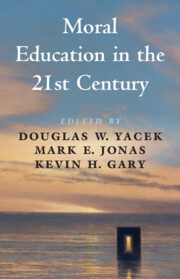Book contents
- Moral Education in the 21st Century
- Moral Education in the 21st Century
- Copyright page
- Contents
- Contributors
- Acknowledgments
- Chapter 1 Why Does Moral Education Matter in the 21st Century?
- Part I Historical Insights for Contemporary Moral Education
- Part II New Approaches to Moral Education
- Chapter 7 Liberal Authority and Moral Education
- Chapter 8 The Capability Approach as a Foundation for Moral Education
- Chapter 9 Recognition Theory and Moral Education
- Chapter 10 Practicing Care Ethics in the Current Context
- Chapter 11 A Non-Ideal Virtue Theory and the Centrality of Education
- Chapter 12 Pragmatist Moral Education
- Part III Responses to Contemporary Moral Problems
- Index
- References
Chapter 7 - Liberal Authority and Moral Education
from Part II - New Approaches to Moral Education
Published online by Cambridge University Press: 01 June 2023
- Moral Education in the 21st Century
- Moral Education in the 21st Century
- Copyright page
- Contents
- Contributors
- Acknowledgments
- Chapter 1 Why Does Moral Education Matter in the 21st Century?
- Part I Historical Insights for Contemporary Moral Education
- Part II New Approaches to Moral Education
- Chapter 7 Liberal Authority and Moral Education
- Chapter 8 The Capability Approach as a Foundation for Moral Education
- Chapter 9 Recognition Theory and Moral Education
- Chapter 10 Practicing Care Ethics in the Current Context
- Chapter 11 A Non-Ideal Virtue Theory and the Centrality of Education
- Chapter 12 Pragmatist Moral Education
- Part III Responses to Contemporary Moral Problems
- Index
- References
Summary
This chapter focuses on the relationship between consent and the moral educational aims of the liberal state. Consent is oft-cited as a condition for the legitimate use of coercive state power. Moral requirements are generally non-coercive on the face of it; nobody has the right to rule over our conscience. Curiously, liberal states often see the moral formation of citizens as subject to political requirements (e.g. compulsory civic education). How does the consent condition bear on these requirements? The general argument is that reasons for withholding consent to a liberal state moral education are often motivated by a specific worry about the relationship between morality and political authority, that is, that such authority will have undesirable downstream effects on these norms and attitudes. The chapter characterizes this worry in philosophical terms and proposes a solution in the form of a consent standard specific to the justification of a liberal state education.
- Type
- Chapter
- Information
- Moral Education in the 21st Century , pp. 115 - 135Publisher: Cambridge University PressPrint publication year: 2023

